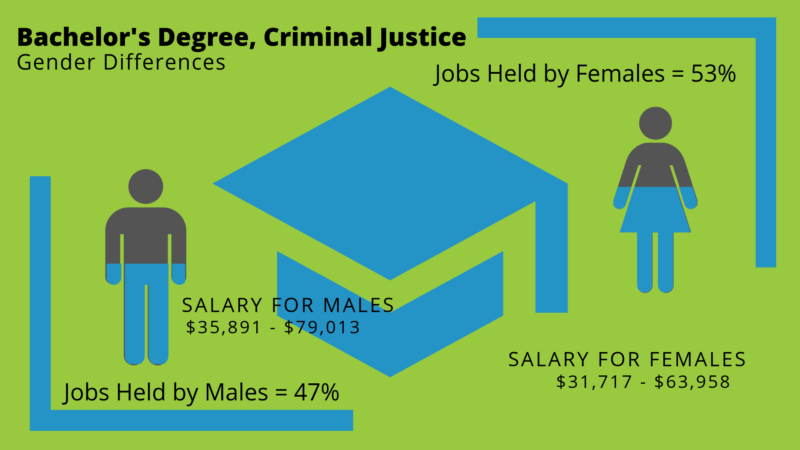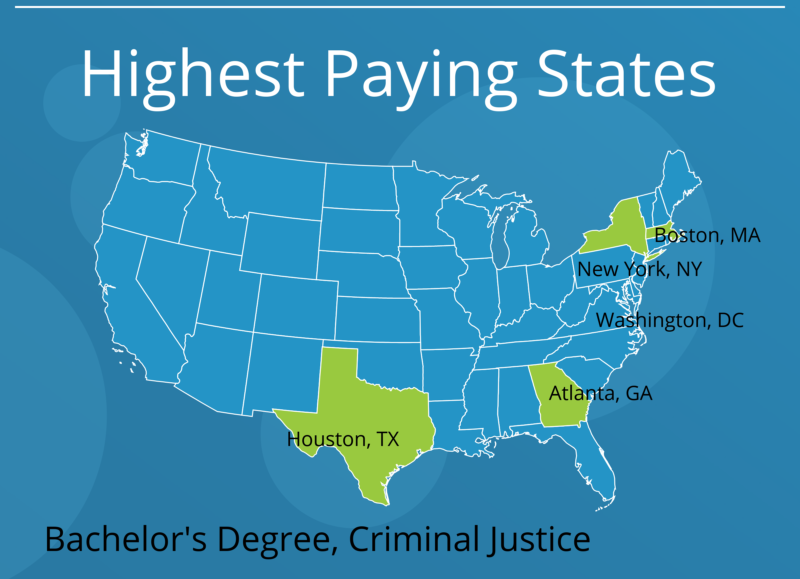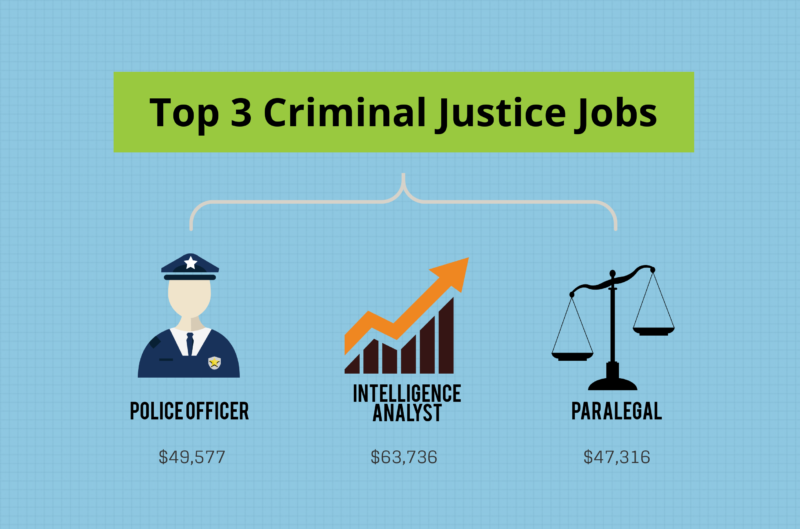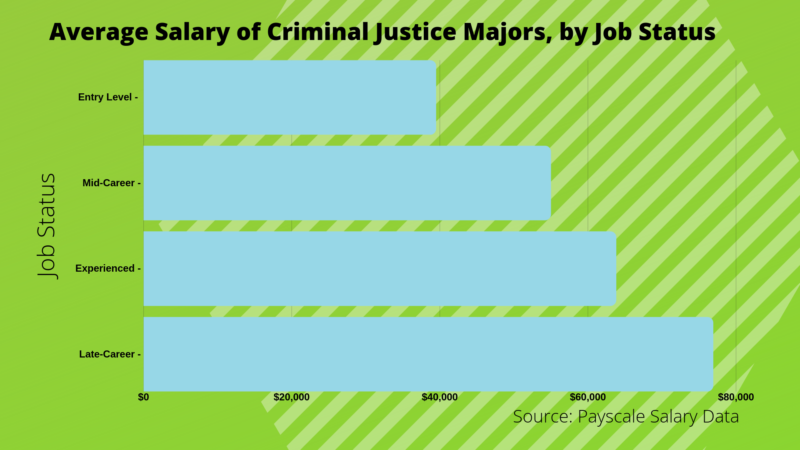Key Information:
- A criminal justice bachelor’s opens up various career opportunities in fields such as law enforcement, cybercrime, forensic science, and juvenile justice.
- With a bachelor’s degree, you’re eligible for higher-ranking and more specialized roles in the criminal justice field.
- A bachelor’s in criminal justice provides essential knowledge and skills that are highly valued in the criminal justice system, including understanding criminal behavior, legal procedures, and effective communication.
Why study criminal justice? If TV and movies have taught us anything, it’s that crimefighting takes guts and confidence — not a college degree. But in the real world, is a criminal justice degree worth it? Is a criminology degree useful? Heck yeah.
Why Study Criminal Justice?
A career in Criminal Justice reaches far beyond dispatchers and corrections officers, and criminal justice degree benefits are many. It’s typically thought of as the process of catching, trying and punishing criminals, but it also includes the study of crime. Why study criminal justice? The study of criminal justice includes studying the causes of crime and criminal behavior. It digs deep into the social aspects of crime, making criminal justice degree benefits to a professional invaluable.
Related:
- Fastest Criminal Justice Degree Programs
- Best Bachelor’s in Criminal Justice Degree Programs
- Best Online Criminal Justice Degree Bachelor’s Programs
- Fastest Online Criminal Justice Degree Bachelor’s Programs
- Most Affordable Criminal Justice Degree Bachelor Programs
Criminal Justice Degree Benefits
Some of the criminal justice degree benefits are jobs in cybercrime, juvenile justice, crime scene investigator, and law enforcement — jobs you don’t get with guts and confidence alone. The Bureau of Labor Statistics predicts increased growth in the need for criminal justice careers, which makes it worthwhile to pursue a criminal justice degree. Job growth for police and detectives is expected to increase by about 7% through 2026. The criminal justice system is emphasizing rehabilitation versus incarceration, so the need for probation officers and criminal treatment specialist is increasing.
These aren’t the only jobs on the rise that benefit from a criminal justice degree. There are probably some jobs that are rarely heard of, such as forensic science technicians and community control officers that require bachelor’s degrees. Professors, forensic physiologists and criminologists need a master’s degree or higher. Recently, there have been unmet demands within the law enforcement field for employees with higher education.
So is a criminology degree useful? Obtaining a degree in criminal justice lays the foundation to develop the skills needed to do the job. Having a degree shows that an individual has to ability to learn, take initiative, and have discipline. Study today also incorporates the use of technology which is more readily used in the field. For these reasons, a candidate with a degree is in a better position when applying for a job.
Is a criminal justice degree worth it? The trends in job growth, salary, and education all point the worthiness of a degree in criminal justice. The demand for higher education is increasing by record speed, and a criminal justice degree puts candidates on the right path for success.

Criminal Justice Colleges, Education, and Career Preparation
According to the Council for Higher Education Accreditation (CHEA), accreditation is the review of the quality of institutions and programs. This is how students and the government know the quality of what an institution is providing. The most recognized type of accreditation in the US is regional accreditation. This means that typically credits or degrees received at one regionally accredited college/university are accepted by other regionally accredited colleges/universities.
There are 6 regional accrediting organizations in the US that provide the accreditation for colleges/universities. These organizations have been reviewed by CHEA for quality. These accreditors are private organizations that aren’t attached to or run by any government agency. Their whole purpose is to review college/university programs for quality.
Accreditation is important when a student is in need of federal funding because the government requires it for a student to be eligible for grants and loans. Employers providing tuition assistance to an employee require the college/university is accredited. The CHEA Database of Institutions and Programs Accredited by Recognized United States Accrediting Organizations contains quality information about more than 8,200 institutions and 20,000 programs in the US.
Criminal Justice Accreditation at the Program Level
Accreditation certifies that quality schools and programs are recognized and fraudulent schools, often known as diploma mills, are not. A program with criminal justice accreditation provides the skills needed for jobs in the industry. Regardless of the job within the criminal justice field, all students need an in-depth understanding and background on the legal system. This is constantly changing as laws are changed and created every day, which changes the information thought in class. This is one of the reasons why criminal justice accreditation is important. Employers expect that job candidates with degrees in criminal justice will have the needed understanding and background.
Prospective criminal justice students should always make sure they are attending a school with regional accreditation, and the school they want to attend is on the Department of Education’s list. A regionally-accredited school with criminal justice accreditation is even better. Diploma mills are an increasing problem with many online programs lacking credibility in the industry. This often means students pay a large price for a fake degree. These places often claim to be accredited, so students should always research the institution to ensure they truly are. Unfortunately, places like this benefit from those looking for a quick solution at a lesser price. They often promise degrees in mere months with very little work involved. Students should realize that this isn’t possible. There is a reason why degrees take a specified amount of time and you can’t shortcut your way to a successful career field.
The accrediting agencies develop criteria to evaluate school and programs. Accreditation leads true colleges/universities to develop quality courses, provide relevant material and qualified instructors to help them meet the requirements. Employers will seek candidates with degrees from accredited colleges/universities. The U.S. Department of Education publishes a list of nationally recognized accrediting agencies that are authorities about the quality of education provided by the institutions and programs they accredit.
Getting a Bachelor’s in Criminal Justice: Is Criminal Justice a Good Major?
A career in criminal justice doesn’t have to begin with a bachelor’s in criminal justice — there are plenty of jobs in the field that don’t require a college degree at all, with just a high school diploma associate’s degree, or a criminal justice certificate. But criminal justice education requirements increase with higher-ranking positions. If you want real authority or advancement, a bachelor’s in criminal justice or a bachelor’s in criminology is the way to go.
The most valuable thing about a bachelor’s in criminal justice or a bachelor’s in criminology is the enormous range of options they give you. Criminal justice jobs can put you on the street as an investigator or safe in an office as an administrator; you may work in a lab, a classroom, or any number of other settings. There are multiple specializations in a college of criminology and criminal justice, and the best criminal justice schools provide a lot of guidance and support in helping students figure out what specializations are right for them.
Is criminal justice a social science? In many colleges, criminal justice is classed in the social sciences, but there’s no real standard for criminal justice the way there may be in nursing or accounting, for instance (you’d never find a nursing program in the humanities department, for instance). But criminal justice is such a large field that some schools have their own dedicated college of criminology and criminal justice, but various elements of criminal justice can fit into all kinds of areas.
The best criminal justice schools are interdisciplinary by necessity, but in colleges or universities that don’t have their own college of criminology and criminal justice, programs may be scattered through several different departments. Many computer science departments, for instance, will offer cyber security and forensics, a criminal justice specialization. On the other hand, humanities schools may offer psychology degrees oriented toward criminal justice. The best colleges for criminal justice and law enforcement put all of these programs together to inform and enrich each other.
So is criminal justice a BA or BS? Yes, both, depending on what department awards it, and sometimes a BAS (Bachelor of Applied Science), a Bachelor of Criminal Justice, or one of many other possible names. Is criminal justice a hard major? Every major has its challenges, but passion and dedication will help you get through the challenges. Is criminal justice a hard major? That depends on how badly you want it.

Criminal Justice Education Requirements
A bachelor’s degree in criminal justice at the best colleges for criminal justice and law enforcement is usually a 4‑year degree that requires 120 credits. A criminal justice certificate or degree can be the starting point for many careers. A bachelor’s in criminal justice covers research to criminal law and gives students working knowledge of the court system. This degree also gives the student a deeper understanding of corrections institutions and law enforcement agencies. Students also learn the tools, methods, and institutions deployed within the criminal justice system.
Some criminal justice degree schools stress theory and research while encouraging scientific inquiry, abstract logical thinking, and critical analysis. Students gain an understanding of the problems of crime and the justice system. Other programs study the issues of crime and justice and how their proper functioning is critical to a healthy society. Students will understand the patterns and causes of crime, along with the challenges that criminal justice agencies face as they attempt to balance control with honoring civil liberties. Students will also study the need for security management as society is facing new safety risks every day and how that impacts the community.
All students will take general criminal justice courses in areas like
- Crime scene investigation
- Crime statistics
- Criminal psychology
- Criminology theory
- Ethics
- Law enforcement procedure
From there, criminal justice education requirements will depend on the degree specialization you choose; those going into administrative work may have more courses in law and management, while students looking for technology-related criminal justice careers will have more computer science courses.
The criminal justice classes to take are taught by those who are a blend of researchers and practitioners with extensive knowledge of the criminal justice field. They aim to create a well-rounded, principled group of graduates at every level of education. Class sizes in the best criminal justice schools will usually be kept small, allowing students to focus on obtaining a deep knowledge of the social science of criminology. Students have a faculty mentor that follows them closely to prepare them to begin a successful career upon graduation. The students are able to customize their degree to pick studies, like pairing criminology with statistics, that fit their desired career path. The students and the community benefit from community-engaged learning where they go into the community to apply what they’ve learned in various settings like prisons to at-risk youth programs.
Can I Get An Online Criminal Justice Degree?
Many schools understand the new challenges that face students as the prevalence of working students is on the rise, and therefore have made criminal justice degree online programs more accessible and affordable. Some offer 100% online and some offer a hybrid solution, which is a combination of online and classroom work. An online criminal justice bachelor degree is an ideal solution for working people already in the criminal justice field who need a degree for advancement.
The best online criminal justice degree programs are geared towards educating students on every phase of the criminal justice system from when a person enters the system to the trial. The professors have courtroom or corrections field experience and bring that knowledge to the classroom. The online criminal justice degree offers various specializations to allow students to tailor their degree to their career goals.
What about criminal justice accreditation? With reputable colleges and universities everywhere offering online criminal justice degree programs, it’s easy to find an accredited criminal justice degree online from some of the most trusted criminal justice schools in the US.
Fast, Cheap, and Under Control
With the demand for criminal justice degree online programs, many criminal justice schools have made concessions to meet students’ needs, including accelerated degree programs and low-tuition programs. Whether you’re looking for the fastest criminal justice degree online, for an affordable criminal justice degree online, or for the rock-bottom cheapest criminal justice degree, the best online colleges for law enforcement are working to reach students where they are.
Online criminal justice certificate programs and criminal justice classes online can also be an affordable alternative, though they have their limitations. You may earn credits from online criminal justice certificate programs that you can later transfer to an online criminal justice degree program, and criminal justice classes online may be transferable as well. These can help shorten your time to get a criminal justice degree online, sometimes to as little as two years or less since you start out ahead.
But can you get an online criminal justice degree free? Kind of. It’s entirely possible to find scholarships, grants, and other financial aid for your online degree, and it may even be possible to find enough to make your online criminal justice degree free. Alternately, if you’re looking for the cheapest criminal justice degree, you may seek out free online law enforcement classes. Some free online law enforcement classes can serve for continuing education credit or meet requirements for certification or licensure, but may not offer college credit toward an online criminal justice degree.
Criminal Justice Certification
There are many types of criminal justice certification in the field that focus on coursework in a specific area, such as security management, corrections leadership, and juvenile justice leadership. There are also criminal justice certification programs that specialize in youth intervention, as well as certificates in technical crime specialization. Any of these certifications offer a chance to retain advanced knowledge and learn ways to begin making a difference to the people in the community.
Security management certification provides training in white-collar crime, homeland security, special security problems, terrorism, criminal justice organizations, and private security. Corrections leadership courses will give a greater understanding of criminal justice sentencing, law, social control, and human resources. A juvenile justice certification focuses on intervention fundamentals and support. These criminal justice certification programs are heavily centered around child abuse treatment, substance abuse intervention, social work theory, crisis intervention, and youth advocacy. There is also a focus on sex offenders in the criminal justice system.
Among law enforcement certification programs, victim advocacy certificates take a deeper dive in the social work side of criminal justice with a focus on domestic violence, crisis intervention, victim’s rights, and victimization. On the opposite side, technical crime specialization certificates focus on crime analysis, crime scene investigation, criminal profiling, and digital forensics and crime. These law enforcement certification programs help officers provide more hands-on experience in areas such as investigative analysis, crime intelligence, crime mapping, and criminal justice technologies.

What are Some Bachelor of Criminal Justice Jobs?
The beauty of a bachelor’s in criminal justice is that there are so many potential careers in law enforcement. Bachelor of criminal justice jobs can be found in every sector, not just in government; private industry employs people with criminal justice degrees for security, criminal justice experts work in education, and professionals with a criminal justice degree can go into private investigation and consulting.
But of course, the government is the primary employer of criminal justice jobs. From the local and state level to federal law enforcement and security agencies — the DEA and ATF, Homeland Security, and the NSA — criminal justice jobs are at the heart of government.
Just a few of the career opportunities form criminal justice majors include:
- paralegal
- parole officers
- secret services
- social services
- forensic psychologist
- private detectives
- victim advocates
- border patrol
It’s not all criminal cases and correctional facilities. Not all jobs require physical fitness, though some jobs in police departments, like patrol officers and other law enforcement officers, may require basic fitness. Criminal justice programs should emphasize decision-making and critical thinking, from the crime lab to the Department of Homeland Security, from the local level to the federal level.
Federal Criminal Justice Jobs
One of the best known — and most prestigious — criminal justice jobs are with the Federal Bureau of Investigation (FBI). FBI Agents are required to have a Bachelor’s Degree, so you must have some type of schooling beyond high school for this career. They begin their career with new agent training and then pick one area in which to specialize. The new agent training includes 1,000 more hours of training in academics, cases, firearms training, and operations. FBI agents are highly trained and specialized and only the best are picked. The areas in which they can start include Information Technology, Intelligence Analysis, Language, and Applied Science, Engineering, and Technology.
Central Intelligence Agency (CIA) special agents are also highly specialized and trained for criminal justice jobs. These agents help the federal government investigate law violations. They collaborate with many other law enforcement agencies regularly. CIA agents must have a bachelor’s degree, which can be a bachelor’s in criminal justice, but doesn’t have to be. They also are required to have at least five years of investigation experience.
A bachelor’s degree is also needed to obtain a job as a postal inspector. They work for the United States Postal Service (USPS) and investigate crime involving the mail. This includes theft, fraud, and vandalism. If a mail crime has been committed, the postal inspector will get involved. Postal inspectors are highly trained and receive an additional 12 weeks of training.
Drug Enforcement Administration (DEA) agents, work for the US Justice Department to enforce the drug laws of the US. They investigate, track, and arrest drug traffickers. This job requires a bachelor’s degree in criminal justice, or other related fields. Once selected for the position, applicants receive 18 weeks of basic agent training at the DEA Training Academy.
What Kind of Forensic Technician Jobs Are Available?
There are many various forensic technician jobs available, such as a blood-spatter analyst, which requires a highly specific education in biology, physics, and chemistry. These candidates are forensic scientists and aim to understand how the blood arrived at the crime scene and to whom it belonged. They will locate and preserve the blood and do an in-depth analysis of it. They often try to reproduce the spatter pattern, which can vary based on motion, gravity, air pressure, among many other things.
Crime Scene Investigators are also part of the forensic science area of crime. According to the Bureau of Labor Statistics, the demand for crime scene investigators will grow by 17% over the next eight years. They collect evidence and analyze it in a lab to identify suspects or corroborate eyewitness testimony. They also can prove the innocence of those who are wrongly accused.
Computer forensics specialists use forensic science, computer science, and criminal investigation. They are highly trained at using advanced data extraction to piece together information that may have seemed lost. Crimes are more frequently being committed with electronic devices, and computer forensics focuses on those type of crimes.
Entry Level Criminal Justice Jobs
A forensic technician is an entry-level criminal justice job focused on the technical aspects of crime investigation. Schooling for criminal justice to become a forensic technician can start as early as high school by focusing on science and math. A degree in forensic science will allow forensic technician candidates to achieve more success in their careers. A forensic technician works in labs, courtrooms, and other places where they reconstruct events and crime scenes based on things like hair samples, broken material, and fingerprints.
According to the Bureau of Labor Statistics, the demand for probation officers — another of the many entry-level criminal justice jobs in law enforcement — will increase by 6% through 2026. They need a bachelor’s degree in criminal justice and they monitor those released from the corrections system to make sure they follow the rules of their probation. They also assist those recently released with adjusting to life after incarceration.
Another of the entry-level criminal justice jobs that can prepare a candidate for more experienced law enforcement is a security guard position. Due to the constant, high demand for security guards the Bureau of Labor Statistics projects a 6% job growth in the next eight years. They patrol assigned areas watching for suspicious activity, ensuring all guidelines required by their employers are enforced. Security guards often work concerts in conjunction with law enforcement to deter crime and ensure safety.
How Much Does a Criminal Justice Degree Make? Criminal Justice Salary Expectations
A degree in criminal justice allows a prospective employee the option of many types of jobs. The criminal justice salary related to these jobs varies greatly as well. Those with a criminal justice degree start at a higher salary than those without a bachelor’s in criminal justice.
The Bureau of Labor Statistics offers the median wages of jobs that fall under a criminal justice salary. For example, a probation officer in 2017 could expect to make around $51,410 per year. The estimated annual criminal justice salary of forensic science technicians is $61,220, but in states like California, Nevada, and Illinois where the demand is higher, the average salary is between $76,160 and $82,650.
The Bureau of Labor Statistics states the demand for police officers will grow by 7% through 2026 and have an average salary of $62,960. However, homicide detectives have an annual average salary of $62,960. Corrections officers earn an average salary of $43,510 working in jails and supervising those who’ve committed crimes. Private investigators tend to work on cases in the private sector that typically do not involve a crime, average a salary around $55,080.
The federal government’s FBI agents start around $45,771, but depending on their location could earn as much as $73,634 annually. DEA agents typically start around $49,746 but within four years can increase to $92,592. CIA special agents tend to make more coming in between $74,872 and $136,771 per year. Forensic scientists earn a median salary of $57,850.

Criminal Justice Associations and Professional Organizations
The learning doesn’t stop after obtaining a degree in criminal justice. In reality, it has just begun. The law is fluid, as it is constantly changing. As a member of the criminal justice community, those with criminal justice degrees must always strive to improve the process and ensure the laws are fair and just. Maintaining membership in professional organizations is one way to connect with like-minded individuals to be a vehicle for change.
This is where the question, is a criminal justice degree worth it, really comes to the fore. It’s worth it if you make it worth it, and one of the key ways of making a criminal justice degree worth it is taking advantage of the professional criminal justice associations out there. Membership in criminal justice associations like the Academy of Criminal Justice Sciences offers many benefits:
- Networking
- Continuing Education
- Job Market Access
- Extra Perqs (insurance, discounts, retirement benefits, etc)
There are many professional criminal justice associations within the field. Some of the most influential include:
Academy of Criminal Justice Sciences (ACJS), whose intent is to foster professional and scholarly activities. They believe in criminal justice education, research, and policy analysis. This group exchanges ideas and gain a better understanding of critical issues in criminal and social justice. As a group they seek criminal justice reform.
The American Academy of Forensic Sciences (AAFS) is a multidisciplinary professional organization that provides leadership and guidance to advance science and how it’s used in the criminal justice system. The objectives are to foster professional networking, integrity, improve practice and encourage collaboration in forensic science.
The National Criminal Justice Association (NCJA) is dedicated to assisting criminal justice agencies in developing and implementing effective criminal justice policy. Members cover a wide range of services within the criminal justice community. They promote a criminal justice system that improves public safety, prevents the devastating effects of criminal behavior, and sanctions offenders fairly. Members are continually educated on federal activities, opportunities for funding, and improving policies and practices.
